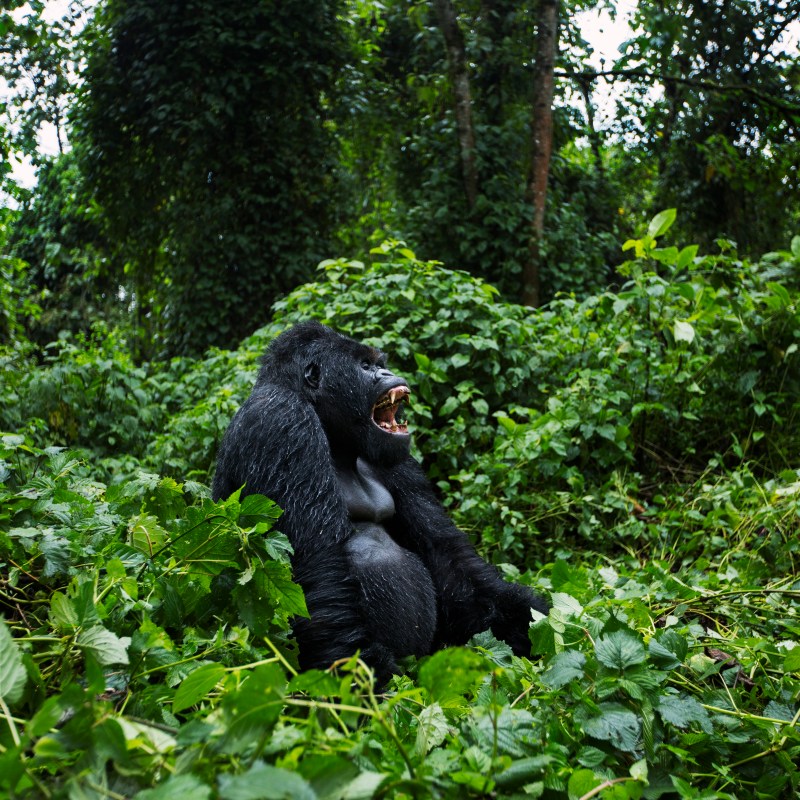
I love a good pop culture debate—especially those that take social media by storm.
Videos by TravelAwaits
This year, one of the most debate-inducing questions is on who would win a street fight: 100 Brits or 100 Americans?
It’s kicked off more than a few lively back-and-forths, and I’ve laughed at just about every argument I’ve seen. (It looks like many Americans believe a single Waffle House shift could do serious damage to even the most hardened Brits.) Even The Guardian has weighed in at this point.
Now, onto my next favorite debate: who would win in a fight between 100 humans and one silverback gorilla?
This one has caught my attention for a few reasons. First, because it’s actually a great question—one that will make you sit and think about mountain gorillas in a new light.
Second, because there are a lot of experts out there who have started weighing in—and some of them actually have face-to-face experience with a silverback gorilla. A wild silverback, I should clarify, which is the oversized male leader of the group.
Ready to see what one Ugandan park ranger has to say about who would win in a fight between 100 humans and a silverback? The prognosis isn’t great, my friends.
100 humans vs silverback: An expert Ugandan National Park ranger weighs in
Unfortunately, I can’t identify who the park ranger is in the Instagram video linked above, nor list which park he works for.
But I’m apt to trust him; Uganda is home to over half the world’s population of wild mountain gorillas, especially at Bwindi Impenetrable National Park, and it’s the prime spot where travelers who want to come face-to-face with a silverback go.
So, what does this intrepid park ranger say about the pretend fight?
Once clarifying the context of the question, the ranger says that humans could theoretically take on a silverback—but only if they are ‘strong-hearted’.
That’s pretty optimistic… but he immediately goes on to clarify that just the sound of a silverback beating its chest is probably enough to send people running for the hills or falling to the ground.
The park ranger says that when a silverback makes an intimidating growl, beats its chest, and charges at you, it’s enough to put you down. Fear will take over, and you won’t be able to move.
That’s spine-tingling enough, but the tour guide then goes on to the next plan of attack: a good old-fashioned clobbering. Silverbacks are short, but their arms are long and muscular. If the humans approach to fight the silverback shoulder to shoulder, a gorilla could wipe out the whole line with a single swipe. Sort of like a devastatingly effective clothesline.
That’s not even counting what type of harm those massive incisors could do. So, it seems we have more fodder for the debate, and it’s not looking good for any humans who decide to fight the silverback.
The bright side? The 100 humans vs silverback fight would never happen. All that chest beating is due to the fact that the silverback would rather scare you into submission than brawl Super Smash Bros. style.
The good news: mountain gorillas don’t want to fight us
Some of the best places in the world to trek into silverback territory are in Uganda, along with the Democratic Republic of the Congo in places like Virunga.
Gorilla tourism has actually served as a boon to highland and lowland mountain gorillas, which are native to the mountainous jungles of central Africa.
These intelligent gorillas face habitat loss and poaching. To survive and continue to thrive, they rely on habitat protection and preservation, along with consistent censuses. The censuses are important because they help conservationists and researchers monitor populations. The highland gorillas have seen a recent uptick in population, while lowland gorillas remain critically endangered.
Like I mentioned above, gorilla tourism helps prevent habitat loss and keeps poachers at bay, boosting efforts of other conservation and rehabilitation groups. So, if you’ve been dreaming of coming closer to these wonderful creatures (and especially the silverback), then don’t let the debate turn you off.
